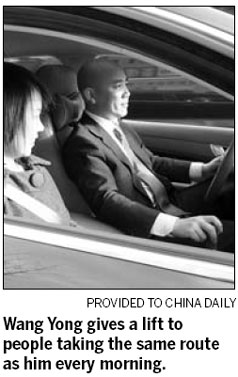Green light for car sharing and pooling
Beijinger Wang Yong's efforts to get the authorities to legalize car sharing by strangers have finally hit the mark.
Since 1998, Wang, 37, has offered free rides to more than 10,000 people in the capital. He usually waits at the No 344 bus stop in Huilongguan, Changping district, every morning and gives a lift to people taking the same route as him.
But it is only recently that Beijing's traffic control authorities officially acknowledged the sharing of a private car.
For the first time, the policy released on Dec 23, 2010, mentions measures to "regulate carpool".

Carpools or sharing has so far not been recognized because it was difficult to tell whether vehicles were offering free rides from unlicensed taxis.
"While my efforts may have played a big role in the (new) policy," Wang says, "it is only a start. We need to list detailed measures to encourage car pooling."
Wang wrote an article on carpooling for the People's Daily, which was published on Oct 1, 2010. In it he said, car sharing could help cut down the number of cars on the road by 10 to 25 percent and offered a viable alternative to such measures as traffic restrictions, taxes or limiting the number of license plates.
Wang sent his article to the mayor's office and received a letter of thanks. He also submitted his proposal thrice to the Chinese People's Political Consultative Conference (CPPCC) Beijing Committee in 2008, 2009 and 2010.
"I've realized that the simpler the suggestions, the more likely they are to be adopted," he says.
Among his proposals are rewards to encourage carpooling, such as throwing open the bus lane for cars carrying three or more passengers.
"People living in the same community, or working in the same company, can form their own carpool groups," Wang says.
He adds that he will continue to pick up strangers at bus stops, because, "I want to prove that sharing a car with others is not difficult".
China Daily
(China Daily 01/26/2011 page20)
















